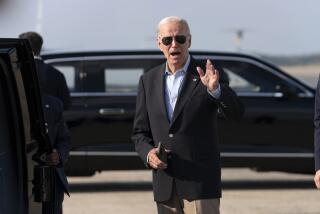Indictments and tax cuts: This week showed the GOP dilemma in full
For more than a year and a half, ever since they realized that Donald Trump had succeeded in taking control of their party, Republicans have confronted a dilemma: They fear his erratic behavior and judgment could ruin them, but fret that they cannot achieve their goals without him.
This week encapsulated that problem. On Monday, the special counsel, Robert S. Mueller III, indicted two former top aides to Trump’s campaign and revealed a plea bargain with a third. Mueller’s prosecutors made clear those were just opening volleys of a long investigation that almost certainly will yield more criminal charges.
For the record:
2:30 p.m. Nov. 7, 2017In an earlier version of this article, Paul Manafort’s business partner, who was also indicted, was misidentified as Robert Gates. His name is Richard Gates.
GOP leaders spent the day insistently fending off questions. “I haven’t even read it, so I’m not going to speculate on something I haven’t read,” House Speaker Paul D. Ryan said when reporters asked about the indictments. What he really wanted to focus on, Ryan said, was cutting taxes — a long-sought GOP goal that Trump has promised to sign into law.
Thursday, after repeated delays, the tax bill finally emerged, only to be hit by complaints from both left and right. Whether it can avoid the fate of the Republican healthcare bill remains very much an open question, in part because a weakened president can’t give the bill much help.
I’m David Lauter, Washington bureau chief. Welcome to the Friday edition of our Essential Politics newsletter, in which we look at the events of the week in Washington and elsewhere in national politics and highlight some particularly insightful stories.
MUELLER’S FIRST SHOT
We learned several things about Mueller and his investigation this week: He runs a tight ship with few leaks, he’s aggressive in his tactics and the legal theories he’ll pursue, as Joe Tanfani wrote, he has a flair for drama, and his investigation still has a long way to run.
Until Monday morning, when the indictments were revealed against Paul Manafort, Trump’s former campaign manager, and Richard Gates, another top Trump campaign aide and longtime Manafort business partner, no one knew for sure who was being charged. Prosecutors waited until the last minute before telling defense lawyers to arrange for their clients to turn themselves in — a rare move in a white-collar case.
The indictments revealed a lot about Manafort’s lavish lifestyle and questionable financial dealings, as David Willman and David Cloud wrote. (And including where he spent more than $500,000 on suits in Beverly Hills.)
But the most revealing moment — at least as far as Mueller’s tactics go — came a couple of hours later. Mueller’s team released the indictments of Manafort and Gates first thing in the morning, dominating the morning news. The White House quickly reacted by distancing itself from Manafort, insisting that his alleged financial crimes began long before he went to work for the campaign and had nothing to do with Trump. The president tweeted that the indictment’s focus on Manafort’s finances, not Russia, showed “NO COLLUSION.”
Only then did Mueller release the second part of the day’s news — a plea bargain with George Papadopoulos, a 30-year-old whom Trump had once touted as a foreign policy advisor. Unlike the Manafort charges, the case against Papadopoulos was all about collusion, although the specific charge was lying to the FBI. As Cloud wrote, Papadopoulos spent much of 2016 seeking a major role in Trump’s campaign by trying to become a go-between with Russia.
Trump backers dismissed Papadopoulos as a low-level climber — the “coffee boy” one Trump advisor called him. But the evidence in the plea agreement showed at minimum that he had repeated contact with more senior campaign officials. And the court documents unsealed Monday, especially the reference to Papadopoulos as a “proactive cooperator” with the investigation, were clearly designed to send a signal that prosecutors know more than they’ve revealed.
Even a coffee boy, after all, can overhear things.
By mid-week, the investigation had already claimed one more head: Sam Clovis, one of Trump’s earliest campaign backers, who had brought Papadopoulos into the campaign, withdrew his nomination for a senior post at the Agriculture Department. He likely would have faced a confirmation hearing dominated by “what did you know and when did you know it” questions.
Having trouble keeping track of the players? Here’s a summary of the charges so far.
Meantime, on Capitol Hill, another aspect of the investigation unfolded as executives from Facebook, Twitter and other social media companies testified about how Russian agents used their platforms in efforts to sow dissension in the U.S. As Cloud reported, lawmakers slammed the social media giants for failing to take the issue seriously enough.
A TAXING WEEK
Perhaps it was just as well for Republicans that Mueller’s announcements dominated the news in the early part of the week. Otherwise, the focus would have been on their struggles to reach agreement on a tax plan.
Lawmakers had promised to reveal a bill on Wednesday, but the day came and went with no agreement. Thursday, they finally released a text, but House Ways & Means chairman Rep. Kevin Brady (R-Texas) made clear it wasn’t final.
As Lisa Mascaro and Jim Puzzanghera reported, the bill, which would set new limits on the mortgage interest deduction, could deliver bigger tax bills to living in places with high real estate costs, notably coastal California and northeastern cities.
California’s GOP House members looked for the bright side, Sarah Wire reported. Their counterparts from New York and New Jersey, however, were more negative, as were some powerful business lobbies.
Republican leaders can probably get the bill through the House, where the leadership almost always prevails. But the compromises needed to accomplish that could endanger the bill’s chances in the Senate.
Already on Thursday, two GOP senators who have been critical of Trump, Jeff Flake of Arizona and Bob Corker of Tennessee, said they were concerned that the proposed tax cuts would increase the deficit too much. As Republican leaders found on healthcare, they have very little margin to maneuver.
As Puzzanghera and Mascaro wrote, the bill, despite tweaks, still delivers big benefits to the most affluent. That’s a selling point for GOP donors, but a liability among most voters.
GOING TO THE OTHER END OF THE EARTH
Trump was no help to the GOP in the healthcare debate — lawmakers said he clearly didn’t understand the policy and couldn’t make a public case for it.
When the tax bill heads to committee next week, he’ll be far away, on a 12-day trip to Asia.
The president can still send messages on Twitter, of course — despite an 11-minute outage Thursday night, which the company blamed on an employee who was leaving the job and deactivated Trump’s feed on the way out. But his feuds with Corker, Flake and other lawmakers have left him with little influence over the people who have the key votes.
The trip begins in Hawaii. As Jaweed Kaleem reports, the sentiment in the heavily Democratic state leans heavily toward “Wish you weren’t here.” Trump is scheduled to visit the headquarters of the Pacific military command, which is embroiled in controversy involving repeated accidents on Navy ships.
From there, he’s scheduled to head to Japan, South Korea and China in a series of stops that, Noah Bierman wrote, likely will be dominated by tensions over North Korea and trade. Trump needs other countries’ help on the first and wants concessions from them on the second. It’s a tough combination to sell.
OTHER NOTABLE STORIES
After the mass shooting in Las Vegas, the Trump administration said the focus should be on the victims, not politics. After the terror attack in New York, by contrast, Trump moved quickly to call for immigration restrictions and denounce the criminal justice system as a “joke,” Cathy Decker wrote.
Decker also previewed next week’s election for governor in Virginia, where both sides are testing likely 2018 election strategies, including racially fraught appeals from the Republicans.
Jerome Powell, Trump’s pick to head the Federal Reserve, is likely to be tested early on interest rate policy, Don Lee wrote.
SEXUAL MISCONDUCT IN CALIFORNIA’S CAPITAL
The wave of allegations of once-hidden sexual harassmentand assaults by prominent men has hit Sacramento, and after years of whispers, women are speaking out, Melanie Mason, Chris Megerian and Jack Dolan reported. Read some of the women’s first-hand accounts.
This is far from the first time that sexual misconduct in Sacramento has come to light. But George Skelton, who has watched the state Capitol longer than anyone, says this time, empowered women could change things.
ALL THE PRESIDENT’S TWEETS
Twitter has long been Trump’s favored means of pushing his message. We’re compiling all of Trump’s tweets. It’s a great resource. Take a look.
LOGISTICS
That wraps up this week. My colleague Christina Bellantoni will be back Monday with the weekday edition of Essential Politics. Until then, keep track of all the developments in national politics and the Trump administration with our Essential Washington blog, at our Politics page and on Twitter @latimespolitics.
Send your comments, suggestions and news tips to politics@latimes.com.
If you like this newsletter, tell your friends to sign up.
More to Read
Get the L.A. Times Politics newsletter
Deeply reported insights into legislation, politics and policy from Sacramento, Washington and beyond. In your inbox three times per week.
You may occasionally receive promotional content from the Los Angeles Times.











